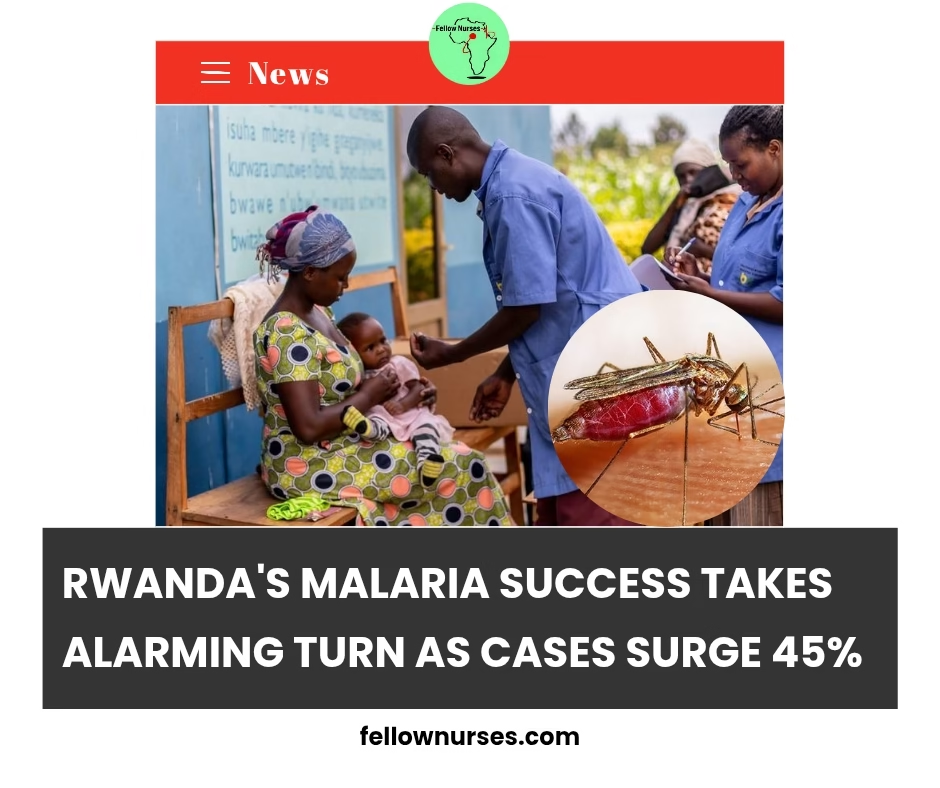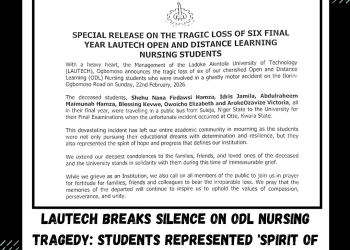Fellow Nurses Africa , Lagos Nigeria. 07 August, 2025.

Rwanda’s health ministry is scrambling to address a dramatic spike in malaria cases that has shattered nearly a decade of steady progress against the mosquito-borne disease, prompting officials to reverse their previous rejection of WHO-recommended vaccines.
The East African nation, once hailed as a model for malaria control, recorded approximately 620,000 cases between January and October 2024 alone, a staggering increase from the previous year’s 430,000 cases. Early 2025 data suggests the upward trend is continuing, with malaria incidence rates rising from the historic low of 40 cases per 1000 persons recorded in 2023. The surge represents the first significant reversal since Rwanda began its aggressive anti-malaria campaign in the mid-2010s.
A Model Program Derailed
Recent data from February 2025 published in the Malaria Journal confirmed Rwanda’s remarkable progress through 2023, showing malaria incidence had dropped to just 40 cases per 1000 persons by late 2023, down from 345 cases per 1000 persons in 2018. However, the 2024 surge caught health officials off guard, with October 2024 alone recording 112,000 cases, nearly 90% concentrated in just 15 districts.
A Model Program Derailed
Public health experts across sub-Saharan Africa have long regarded Rwanda’s malaria reduction efforts as one of the most successful programs on the continent. The country’s methodical approach—combining comprehensive bed net distribution, targeted indoor residual spraying, and robust community health worker programs drove cases down from nearly 5 million in 2016 to historic lows.
What made Rwanda’s program particularly effective was its integration with the existing community health cooperative model. Community health workers, known locally as Abajyanama b’ubuzima, were trained not just to treat cases, but to conduct active surveillance and educate families about prevention. This grassroots approach created a surveillance network that could detect and respond to outbreaks within days.
2025: The Surge Continues
Preliminary reports from the Rwanda Biomedical Centre indicate that the troubling trend identified in 2024 has continued into 2025. While comprehensive annual data is not yet available, health officials report that the upward trajectory shows no signs of immediate reversal, with some districts experiencing case loads not seen since the early 2010s.
“We thought we had cracked the code,” said Dr. Sabin Nsanzimana, Rwanda’s Minister of Health, during a press briefing last week. “Our data showed consistent year-over-year declines. The 2023 numbers gave us confidence we were on track for elimination by 2030.”
Warning Signs Missed
However, experienced public health experts now point to warning signals that may have been overlooked. Field reports from community health workers in the Eastern Province began noting treatment failures as early as late 2023, though these were initially attributed to patient non-compliance rather than drug resistance.
Dr. Corine Karema, former head of Rwanda’s Malaria and Other Parasitic Diseases Division, noted in recent interviews that mosquito behavior studies conducted in 2023 showed concerning trends. “We were seeing increased outdoor biting activity, particularly in peri-urban areas where people spend evenings outside,” she explained. “Our indoor control measures suddenly became less effective.”
The resistance patterns emerging in Rwanda mirror troubling trends across the region. Preliminary data shown to SciDev.Net by the RBC indicates that the effectiveness of the artemisinin drug is diminishing due to resistance.
Artemisinin-based combination therapies (ACTs), the gold standard for malaria treatment, are showing reduced efficacy rates. In some districts, treatment failure rates have climbed above 10% well beyond WHO’s recommended threshold for switching therapeutic protocols.
Environmental Factors Compound Crisis
Climate variability has created additional challenges. Unseasonably heavy rains in 2024 created numerous temporary breeding sites, while rising temperatures have extended mosquito survival rates. Construction projects in rapidly urbanizing areas inadvertently created water collection points that became prime breeding grounds.
“We’re dealing with a perfect storm,” explained Dr. Aimable Mbituyumuremyi, head of the Rwanda Biomedical Centre’s Malaria and Other Parasitic Diseases Division. “Our successful interventions created a vulnerable population with reduced immunity, and now we’re facing more resilient parasites and vectors.”
Vaccine Reversal Signals Pragmatic Shift
Perhaps most significantly, Rwanda’s health ministry has begun formal discussions with WHO and Gavi about accessing RTS,S malaria vaccines—a marked reversal from their 2023 decision to opt out of the initial rollout program.
“We made our previous decision based on the data we had at the time,” acknowledged Minister Nsanzimana. “When the evidence changes, policy must adapt. We’re not abandoning our proven interventions—we’re strengthening them.”
The vaccine discussions represent more than a tactical shift; they signal recognition that single-intervention approaches may be insufficient against evolving malaria transmission patterns. Countries like Ghana and Kenya, early adopters of the RTS,S vaccine, report modest but meaningful reductions in severe malaria cases among vaccinated children.
Clinical Impact on Healthcare Systems
From a healthcare delivery perspective, the impact extends beyond statistics. Health facilities that had begun reallocating resources to other priorities are now seeing wards fill with malaria patients again. Pediatric units, in particular, are managing increased caseloads of severe malaria—a stark reminder of how quickly progress can reverse.
“Our emergency department went from seeing maybe two or three severe malaria cases per week to seeing that many per day,” reported Marie-Claire Uwimana, head nurse at Kigali University Teaching Hospital. “Staff who had moved on to other specialties are being called back to manage the surge.”
Looking Forward: Lessons for Global Health
Rwanda’s experience offers sobering lessons for malaria elimination efforts continent-wide. Success in disease control requires sustained vigilance and adaptive strategies. The country’s willingness to acknowledge setbacks and adjust approaches may ultimately strengthen its long-term prospects.
Health officials maintain that the 2030 elimination target remains achievable, though it will require expanded funding, enhanced surveillance systems, and likely the integration of new tools including vaccines and next-generation insecticides.
“This setback is a reminder that malaria elimination is not a straight line,” noted Dr. Nsanzimana. “But our systems are strong, our commitment is unwavering, and we’re learning to adapt faster than the disease can evolve.”
The international health community will be watching closely as Rwanda implements its revised strategy. Success in reversing this surge could provide a roadmap for other countries facing similar challenges in their elimination efforts.
This report was compiled with input from health officials, medical professionals, and public health experts familiar with malaria control programs across sub-Saharan Africa.
Fellow Nurses Africa is the independent voice of African Nursing, we educate, inform and support the nursing profession.











Am interested in it
Am interested in it I’m auxiliary nurse